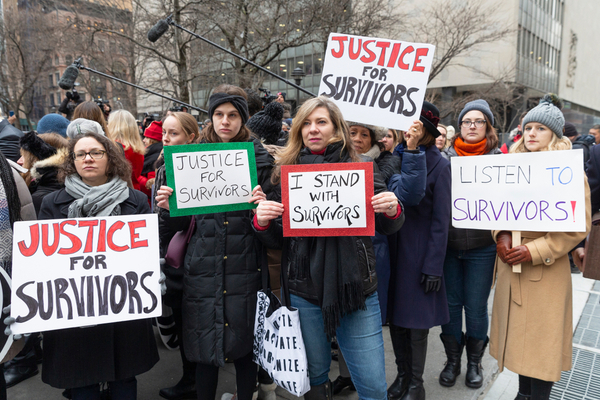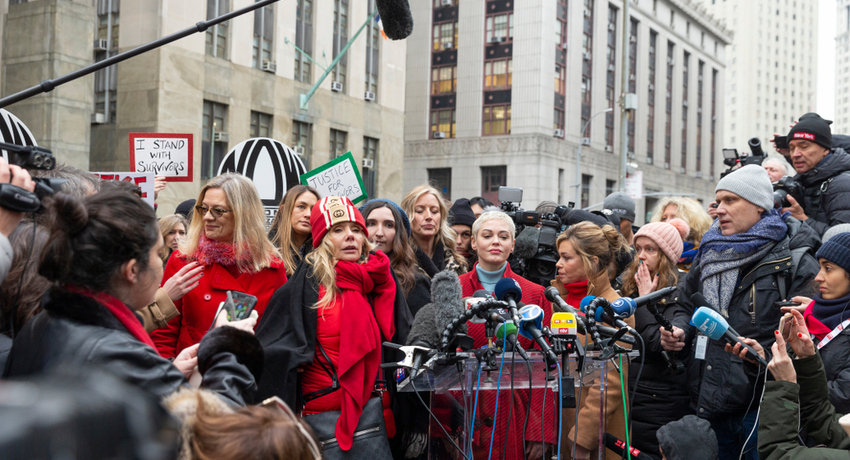With the jury expected to deliver its verdict this week, much attention will be paid to whether Harvey Weinstein’s defence – that victims of sexual assault fight back or report – carried any weight.
But the scene Weinstein’s defence team has evoked is the Hollywood version of sexual assault, not the reality.
90% of girls have been sexually harassed by a boy at school, including having their body parts rated, having their clothes pulled at, and being touched against their wishes.
As a developmental psychologist who studies sexual harassment in adolescence, none of the testimony of the accusers is surprising. Our own US-based research shows that 90% of girls have been sexually harassed by a boy at school. This includes having their body parts rated, having their clothes pulled at, and being touched against their wishes. In nationally representative samples, we see that more than half of all girls are sexually harassed each year, many of them every day. For really pretty girls who hit puberty early, the odds of being sexually harassed are even higher.
 Sexual harassment is not only common, it damages girls who experience it. Three decades of research has consistently shown that girls who have been sexually harassed have lower self-esteem, are more depressed and anxious, have more negative opinions about their body and are at greater risk for developing eating disorders, have more suicidal thoughts, are more likely to abuse drugs and alcohol to cope, and have a harder time sleeping than girls who haven’t been sexually harassed. They are also more likely to miss school, have lower grades after the sexual harassment, and are generally more pessimistic about their futures.
Sexual harassment is not only common, it damages girls who experience it. Three decades of research has consistently shown that girls who have been sexually harassed have lower self-esteem, are more depressed and anxious, have more negative opinions about their body and are at greater risk for developing eating disorders, have more suicidal thoughts, are more likely to abuse drugs and alcohol to cope, and have a harder time sleeping than girls who haven’t been sexually harassed. They are also more likely to miss school, have lower grades after the sexual harassment, and are generally more pessimistic about their futures.
More than 60% of teen girls say they try to “forget about” or “ignore” the harassment, or simply “do nothing.” Only one in 10 tell a teacher.
And yet, most girls do nothing in response. Even though they report feeling scared, angry, helpless and embarrassed, they rarely tell the harassers to stop. More than 60% of teen girls say they try to “forget about” or “ignore” the harassment, or simply “do nothing.” Only one in 10 tell a teacher.
Why do so few girls ever confront or report their sexual harassers? Based on a 2018 Plan International survey of teen girls, more than half of the girls thought it would not make any difference to tell anyone. Few girls think their schools would act to protect them. Indeed, research with teachers nationwide shows that teachers often dismiss sexual harassment as “boys being boys” and rarely intervene. When girls do report it, they are often the ones punished rather than the boys, blamed for wearing the wrong clothes and sent home for a dress code violation.
Lesson learned. Harvey Weinstein’s attorney Donna Rotunno encapsulated she said she never put herself in situations where she would be assaulted. From middle school on, girls learn that we blame the victim.
 Girls are also worried about saying anything about sexual harassment. More than 60% of teen girls worry about retaliation, concerned “that the other person would try to get back at me” if they confront or report him. Actresses worried about being black banned in Hollywood (and several were). Others worried about playing the role of “nice girl.” More than one in three girls don’t confront or report sexual harassment because they are worried that people will think they are “trying to cause trouble” or “just being emotional.” More than half of teen girls say they would never report sexual harassment because people would not like them if they did.
Girls are also worried about saying anything about sexual harassment. More than 60% of teen girls worry about retaliation, concerned “that the other person would try to get back at me” if they confront or report him. Actresses worried about being black banned in Hollywood (and several were). Others worried about playing the role of “nice girl.” More than one in three girls don’t confront or report sexual harassment because they are worried that people will think they are “trying to cause trouble” or “just being emotional.” More than half of teen girls say they would never report sexual harassment because people would not like them if they did.
These are pressures girls have internalised their entire lives. Girls, from infancy, have been taught to be passive, smile, and make everyone comfortable. Even research with toddlers shows girls are rewarded for being submissive and sweet and punished for being too assertive.
By the time puberty and adolescence starts, and sexual harassment becomes part of their daily school experience, girls have learned to pretend it doesn’t bother them in order to try to maintain some dignity. At the same time, they feel powerless and embarrassed.
So when a sexual assault happens, it is just the exclamation point on a longer sentence.
So when a sexual assault happens, it is just the exclamation point on a longer sentence. And reactions to sexual assault are often the same – try to pretend it didn’t happen, try to still be liked despite the degradation, worry about retaliation, and feel powerless to report it.
The fact that these reactions are exactly what Harvey Weinstein’s accusers report makes the charges more believable, not less.
They are following the exact same script that millions of girls follow every day.
This is an edited version of an article that originally appeared at Psychology Today.




